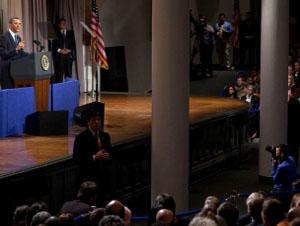Global implications of US banking reform
President Obama addresses Wall Street bankers and financial experts. (Image: White House Photo, Samantha Appleton)
This story is adapted from a broadcast audio segment; use audio player to listen to story in its entirety.
Story by Matthew Bell, PRI’s “The World”
Barack Obama went to Manhattan yesterday to tell Wall Street to do the right thing. The president railed against corporate greed and declared financial reform a priority for the White House. Mr. Obama says his goal is to prevent another financial crisis and by extension, another global economic meltdown.
President Obama told the room full of Wall Street bankers and financial experts to join him in embracing new financial reforms for the good of the financial system and the country.
Mr. Obama drove the point home by quoting “Time” magazine:
“Big bankers stared at one another in anger and astonishment. A bill just passed, would rivet upon their institutions what they considered a monstrous system. Such a system they felt would not only rob them of their pride of profession but would reduce all US banking to its lowest level. That appeared in ‘Time’ magazine in June of 1933.”
The president wants Congress to pass what he calls common sense financial reforms, contained in a bill passed by the House and being debated in the Senate. He said the bill would do four things: get taxpayers off the hook when financial institutions fail, limit the risk that banks can take with depositors’ money, bring more transparency to exotic financial markets such as derivatives trading and finally, provide more consumer protections.
“Part of what led to the turmoil of the past two years was that in the absence of clear rules and sound practices, people didn’t trust that our system was one in which it was safe to invest or lend,” said President Obama. “And as we’ve seen, that harms all of us. So by enacting these reforms, we’ll help ensure that our financial system and our economy continues to be the envy of the world.”
Mr. Obama said the recession proved that Wall Street and Main Street rise and fall together. There’s a similar connection between the US and the global economy, where financial chaos here spreads to the rest of the world.
Foreign leaders were quick to tell Washington to get its financial act together for everyone’s sake. The head of the International Monetary Fund, Dominique Strauss Kahn, applauded the US and other nations for implementing new financial reforms, but he said the last two years have shown what’s needed is a unified front on financial reform.
“My concern is that even if it’s right when you look from the country side — what the US is doing, what the European Union wants to do, what the Japanese wants to do — there may be some inconsistency when you look at all this together. That’s why we’re trying to push [for a] more coordinated, more global way to answer this question, and to put in place a new kind of regulation.”
One thing the IMF has floated is the idea of imposing new worldwide bank taxes. There are similar proposals being debated in Congress.
Economist Dean Baker with the Center for Economic and Policy Research in Washington says he doesn’t often agree with the IMF, but new bank taxes would be a good idea. As for the package of financial reforms President Obama is pushing for, Baker is skeptical.
“I don’t see it producing a fundamental clean-up, so whatever day this gets passed, the next day the financial system’s not going to work all that much different than it did the day before.”
Baker says the reforms being discussed in Congress might be an improvement, but they fall short of what’s really needed to prevent another global recession. And part of the problem here, says former IMF banker, Kenneth Rogoff, is that this stuff is not easy to grasp.
“Everyone understands that the problems started in the United States and Britain and spread to their countries, but some of it is just so complicated that people don’t understand it, which is part of what allows the banks to get away with these incredible practices that you read about which risk taxpayer money, make big profits in the short run but put the system at risk. The rest of the world certainly would like to see tougher regulation in the US. They are worried that they don’t have much leverage over us.”
At the same time, the banks have plenty of leverage. President Obama acknowledged that, and made a plea to Wall Street to call off its legion of highly paid lobbyists that have descended on Washington.
PRI’s “The World” is a one-hour, weekday radio news magazine offering a mix of news, features, interviews, and music from around the globe. “The World” is a co-production of the BBC World Service, PRI and WGBH Boston. More “The World.”
Every day, reporters and producers at The World are hard at work bringing you human-centered news from across the globe. But we can’t do it without you. We need your support to ensure we can continue this work for another year.
Make a gift today, and you’ll help us unlock a matching gift of $67,000!
